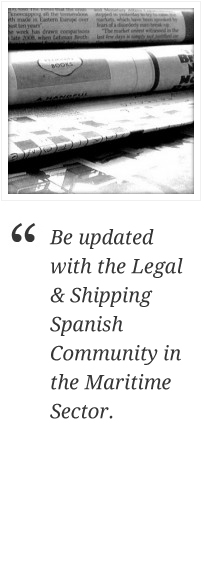September: CIRCULAR 5A/2003
NEW REGULATION RULING THE PROCEDURES FOR THE SAFE LOADING / UNLOADING OPERATIONS OF BULK CARRIERS IN SPANISH TERMINALS. LACK OF COMPLIANCE BY VESSEL CAN BE TYPIFIED AS AN INFRACTION
In July 2003 the Spanish government published a new regulation, Royal Decree 995/2003, in order to regulate the requirements and proceeding for loading / unloading operations for Bulk Carriers in Spanish Ports. This regulation incorporates EU Directive 2001/96/CE.
The purpose of this Royal Decree is to enhance the safety of bulk carriers calling at Spanish terminals in order to load or unload solid bulk cargoes, by reducing the risks of excessive stresses and physical damage to the ship’s structure during loading or unloading operations, through the establishment of harmonised suitability requirements for those ships and terminals and harmonised procedures for co – operation and communication between those ships and terminals.
This regulation will be applicable to all bulk carriers berthed in a Spanish terminal from loading / unloading purposes. It makes compulsory certain elements of the BLU Code.
Terminal operators shall satisfy themselves as to the operational suitability of bulk carriers for the loading or unloading of solid bulk cargoes by checking that the bulk carriers comply the requirements stated in the Annex I of this Royal Decree which basically establish the needs of the bulk carrier to load / unload (that is, their aptitude). Terminal operators shall ensure as well that, as regards their responsibilities, the terminals comply with the provisions of Annex II, which establish the needs of the Terminal in order to load / unload bulk cargo (that is, their aptitude).
Therefore and although this regulation also includes obligations for the terminals, we detail the most important aspects related to the vessels.
Responsibilities of the Master established in this new regulation:
- The Master shall be responsible at all times for the safe loading and unloading operations of the bulk carrier under his command.
- Before any solid bulk cargo is loaded, the Master shall ensure that he has received the   required cargo information and, where required, a solid bulk cargo density declaration. This information shall be contained in a form for required cargo information as set out in Annex 5 of the BLU Code.
- To sign a loading plan with the representative of the terminal before starting loading operations.
- To state in writing with the representative of the terminal after completion of operations that the vessel has been loaded / unloaded according to the plan, mentioning all modification which has been agreed, which will have previously been agreed with the terminal in a reviewed plan.
The information to be provided by the Master to the terminal, amongst others:
- The ship’s ETA off the port as early as possible. This advice shall be updated as appropriate.
- At the time of the initial time of arrival advice: name, call sign, IMO number, flag, port of registry.
- Loading or unloading plan, stating the quantity of cargo, stowage by hatches, loading or unloading order and the quantity to be loaded in each pour or unloaded in each stage of the discharge.
- Arrival and proposed departure draughts.
- Time required for ballasting or de – ballasting.
Prior to and during loading or unloading operations the Master shall ensure that:
- The loading or unloading of cargo and the discharge or intake of ballast water is under the control of the ship’s officer in charge.
- The disposition of cargo and ballast water is monitored throughout the loading or unloading process to ensure that the ship’s structure is not overstressed.
- The ship shall be kept upright or, if a list is required for operational reasons, it shall be kept as small as possible.
- The ship remains securely moored, taking due account of local weather conditions and forecasts.
- Sufficient officers and crew are retained on board to attend to the adjustment of the mooring lines or for any normal or emergency situation, being aware of the need of the crew to have sufficient rest periods to avoid fatigue.
- The terminal representative is aware of the cargo trimming requirements, which shall be in accordance with the procedures of the IMO Code.
It is important to note that the non-compliance with the requirements of this Royal Decree can be typified as an administrative infraction as per the 27/1992 Spanish Ports and Merchant Marine Law. The sanction against the vessel would depend on the type of infringement: (i) Small (fines up to Euro 60,101); Severe (fines up to Euro 120,202 or Euro 300,506 depending on the infringement), and, (iii) Very severe (fines up to Euro 901,518). It is important to point out that together with the decision to initiate Sanctioning Proceedings, the Harbour Master will usually adopt the detention of the vessel as a preventive measure to guarantee the payment of the possible sanction. The only way to release the vessel will be by providing a guarantee.
This Royal Decree came into force in 8 August 2003, however the harmonised proceedings and requirements ruled, will be applied as from 1March 2004.
Should any shipowners or operators have any queries, they should not hesitate to contact us.

